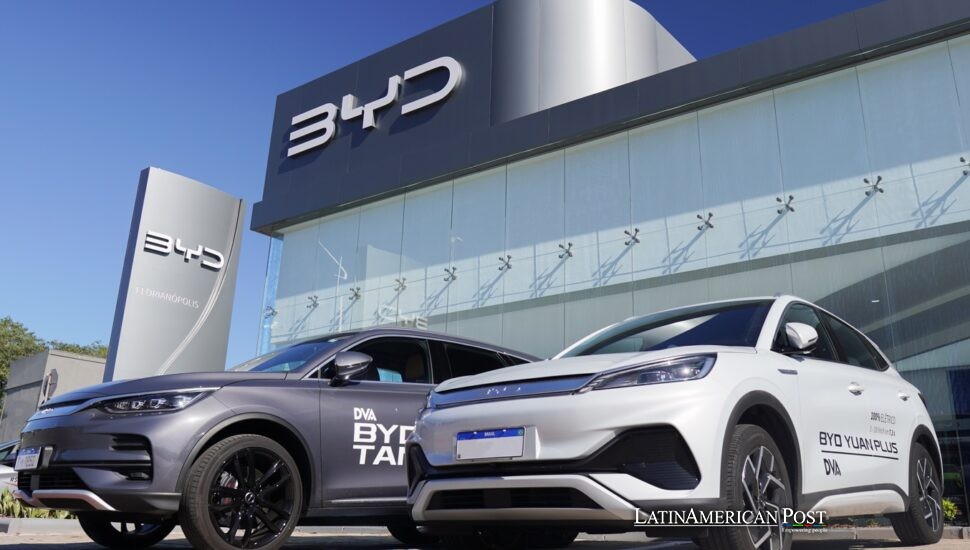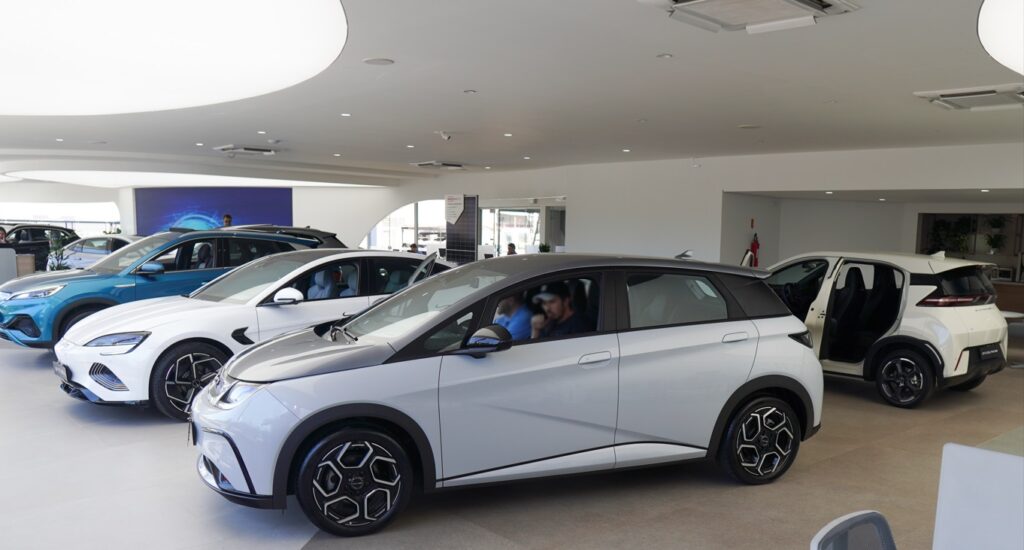Brazil Braces as BYD Chinese EV Armada Rolls In

A vessel longer than three city blocks slid into the southern port of Itajaí last month, carrying 7,000 Chinese electric and hybrid cars. This was the fourth such convoy this year, and its arrival ignited a fierce debate over Brazil’s green ambitions and industrial future.
A Super-Carrier Splits the Horizon
It arrived at dawn, its steel hull slicing the morning mist. Dock workers gathered silently as the BYD Explorer No. 1—a massive ship that could host a music festival on deck—eased into port. Below its towering decks, thousands of electric cars gleamed under floodlights: Seagull hatchbacks and Song Plus SUVs, fresh off the assembly lines in China, now bound for Brazil’s sprawling highways.
It wasn’t the first time. And it wouldn’t be the last.
Shipping logs show that China’s BYD has shipped over 22,000 vehicles to Brazil in just five months. What once seemed like a trickle has become a tide. At Itajaí, the unloading shattered records for unitized car imports in a single day, surpassing the historic peaks once held by gasoline sedans from Europe.
“This is a signal,” said Lívia Machado, an economist with Brazil’s Getúlio Vargas Foundation, speaking to Reuters. “Brazil is the biggest open door still standing.” In a world where the US and Europe are tightening tariffs on Chinese cars—some now exceeding 45%—Brazil remains an open front, a tempting, fertile market where electrification is still catching up. Despite ranking sixth globally in car sales, Brazil still trails far behind Chile and Mexico in terms of EV adoption. The Chinese are not waiting.
A Green Rush or Trojan Horse?
The seeds of this moment were planted a decade ago. In 2015, Brasília waived import duties on battery-powered vehicles, betting it would lure investment and assembly plants. But the plants never came. The ships did. Now, that gamble is under fire.
Last year, the Lula administration reintroduced a 10% levy on EV imports, planning to raise it until it reaches parity—35%—with combustion-engine cars by 2026. But Brazil’s automakers, under the umbrella of ANFAVEA, want to hit that cap sooner. “Excess imports depress investment,” warned ANFAVEA president Igor Calvet to Reuters, pointing to the postponement of R $5 billion in upgrades by firms like Volkswagen and GM.
Labor leaders are even more blunt. “Other countries slammed the door on Chinese cars,” said Arnaldo da Silva, head of Industrial Brasil. “Brazil left it ajar—and could lose 100,000 jobs.”
BYD declined to speak directly with Reuters but previously defended its mission: “To democratize clean mobility.” Under current rules, the company is allowed generous duty-free quotas—US$ $169 million for plug-in hybrids and US$ $226 million for EVs—through July 2025. According to analysts at Banco Itaú, front-loading through these quotas shaves nearly US $2,000 off showroom prices, letting BYD’s vehicles undercut local gas cars even after markups. The result is a market twisted in paradox: foreign-made EVs are cheaper than Brazilian-built compacts, at least for now.
Factories Promised, Timelines Slipping
To calm the brewing storm, BYD made a dramatic move in 2023—buying the ghost of Ford’s Bahia plant for one symbolic real. The deal promised three EV assembly lines, 5,000 jobs, and a turning point. But progress has lagged.
Construction photos obtained by Reuters show frames rising from the red earth, but local officials now cite late 2026 as the likely start for a “fully functional” line—nearly a year behind schedule. A labor ministry investigation into migrant worker abuse by a subcontractor didn’t help, forcing temporary stoppages. BYD claims to have cooperated fully and severed ties with the accused firm.
Remarkable Wall Motors, too, has stumbled. After purchasing a Mercedes-Benz facility outside São Paulo, it pushed the Brazilian debut of its Haval H6 hybrid to the second half of this year.
Behind the delays lies a harsher truth. “The supply chain isn’t ready,” said Ricardo Bastos, president of the EV association ABVE, explaining how Brazil’s lithium-rich soils are still exporting raw material to China instead of building batteries at home. The entire ecosystem—from cathodes to software—is being built from scratch.
Like da Silva, Skeptics see a trap: assembly in Brazil, but real value—batteries, motors, code—shipped from Shenzhen. Officials argue that local content is better than none, and reducing freight emissions is still a win. “China’s demand for soy and iron kept us afloat for twenty years,” said one senior aide at the Ministry of Development. “Now the energy transition could tie us together through something more valuable—industry.”

byd.com
Buyers Torn Between Price and Patriotism
Salesman Marcos Vieira taps a BYD Dolphin’s sleek screen on Avenida Europa in São Paulo, where high-end showrooms line the boulevard. “Zero to a hundred in seven seconds,” he tells a wide-eyed couple. “And it’s cheaper to charge than your phone plan.”
The pitch is working.
According to ABVE, Chinese brands command over 80% of Brazil’s EV market. The BYD Seagull, priced at R $115,000 after incentives, undercuts the local Fiat Pulse by 15% while offering a more extended range and lower running costs. Battery prices in China keep falling, down another 11% this year.
Still, price isn’t everything.
A Paraná Pesquisas survey found that half of Brazilian buyers would still prefer a car made at home, even if it costs up to 10% more. That leaves a slim but meaningful opening for domestic brands—if they can move fast enough to bring hybrids or EVs to market.
President Lula da Silva faces a delicate calculus. In November, he’ll host the COP30 summit in Belém, a moment to showcase Brazil’s climate leadership. However, stricter tariffs may protect workers while slowing the EV transition needed to meet Brazil’s 2030 emissions targets.
Those goals are ambitious: 2 million electric cars by 2030, up from just 200,000 today. And they may be impossible without imports—at least in the short term.
Also Read: Latin America Still Sips Toddy While Us Vintage Drink’s Past Forgotten
Somewhere beyond the Panama Canal, the BYD Explorer No. 1 is already on its return voyage; it holds full again, its sights set on Brazil’s spring sales season. What greets it at the dock—welcoming arms or a tariff wall—will depend not on engineers or consumers but on a political decision in Brasília.
And whether Brazil’s promised EV factories will stay dreams on paper or finally start humming to life.




